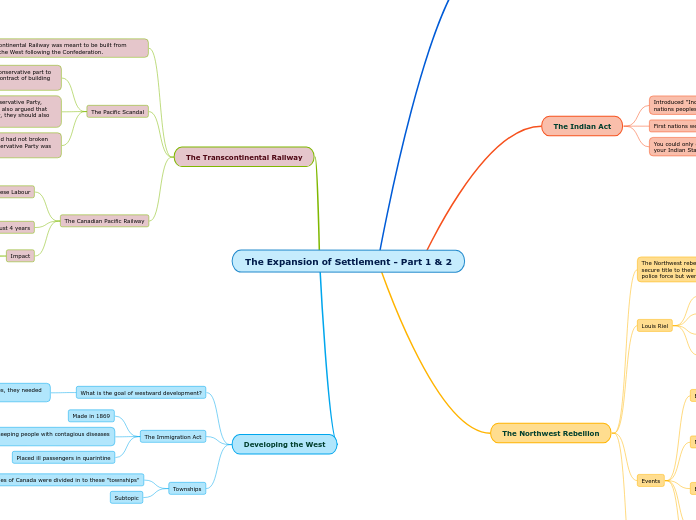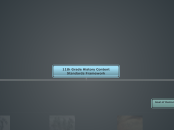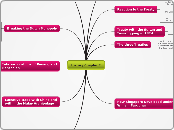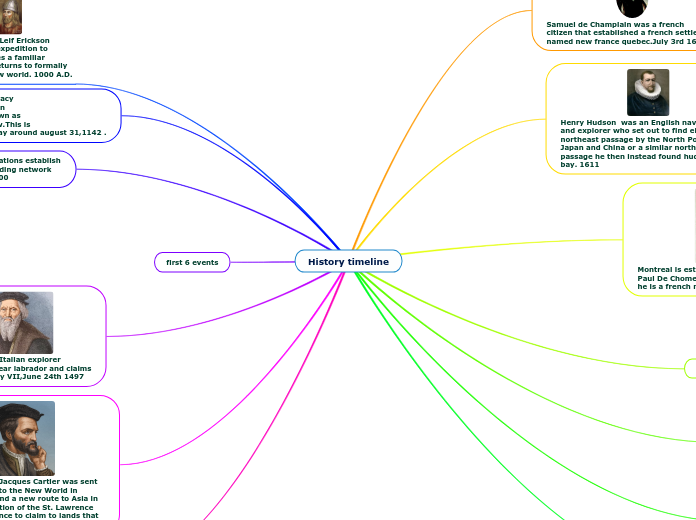The Expansion of Settlement - Part 1 & 2
Developing the West
Townships
Subtopic
The Prairies of Canada were divided in to these "townships"
The Immigration Act
Placed ill passengers in quarintine
Made with the goal of keeping people with contagious diseases outside the country
Made in 1869
What is the goal of westward development?
As Canada has just claimed most of the prairies, they needed to fill up these prairies with people.
The Transcontinental Railway
The Canadian Pacific Railway
Impact
Encouraged and allowed settlement in the prairies
Allowed easy transportation throughout most of Canada
This railway was built in just 4 years
Chinese Labour
Chinese workers often did the most dangerous work and were paid less
As there was a lack of workers working on the CPR, workers were imported from China to help with the project.
The Pacific Scandal
Some people argued that John A Macdonald had not broken the law since the money given to the Conservative Party was not directly in exchange for the contract.
Because of the $360,000 given to the Conservative Party, many people considered this a bribe. They also argued that politicians should not just abide by the law, they should also appear to abide by the law.
Sir Hugh Allan donated $360,000 to the Conservative part to help with Campaign expenses. Later, the contract of building this railroad was given to Sir Hugh Allan.
The Transcontinental Railway was meant to be built from Ontario to the West following the Confederation.
The Northwest Rebellion
Aftermath
Tensions between the English and French exploded.
Events
Battle of Batoche
The government soldiers and police with their superior numbers and firearms were easily able to take over the stronghold.
Dumont's forces grouped together to defend Batoche.
Battle of Cut Knife
During the encounter, Poundmaker convinced the Crees to retreat which heavily reduced the number of casulaties.
Battle of Fish Creek
Both sides withdrew from Fish Creek after government reinforcements arrived.
Dumont organized an ambush against the government soldiers at Fish Creek.
Massacre as Frog Lake
9 losses
Frog lake was attacked by a band of Crees on April 2nd.
Battle of Duck Lake
Louis' force won this battle and forced the police and army to retreat.
Louis' force used Guerrilla tactics against the army and police force.
Louis Riel
Eventually tried for treason and executed.
Realizing that war was inevitable, he appointed Gabriel Dumont to be his military commander.
Once again, Louis created a provisional government
Louis Riel returned to Canada in 1885 to lead the Metis again.
The Northwest rebellion started when the Métis requested a secure title to their lands, agricultural aid, schools, and a local police force but were ignored.
The Indian Act
You could only get a full Canadian citizenship by giving up your Indian Status.
First nations were prohibited to drink and vote unless they .
Introduced "Indian Status" as a system of identifying first nations peoples.
Treaties and Land Treaties
Numbered treaties
These treaties gave Canada land in areas that are now Alberta, Manitoba and Saskatchewan.
A series of treaties made by the Canadian Government and the Indigenous peoples, mainly for land on the prairies.
How did Canada use these treaties to gain land?
The Canadian Government promised to provide supplies, money and many other benefits to the indigenous peoples in return for this land.
Why did Canada sign these land treaties with the Indigenous peoples?
Canada wanted to claim the prairies before they were taken by the USA but the Indigenous Peoples were already living there.









